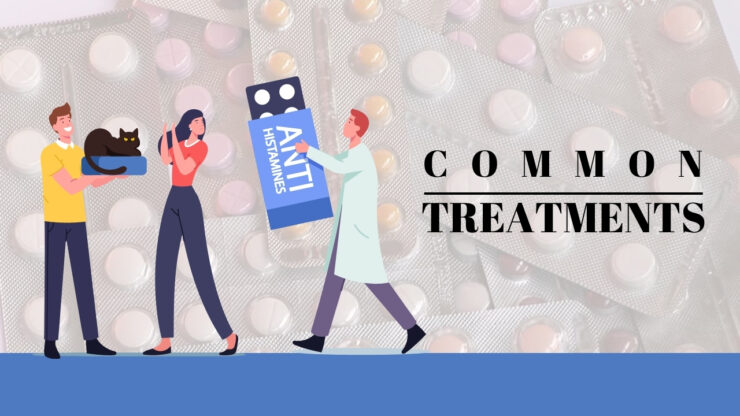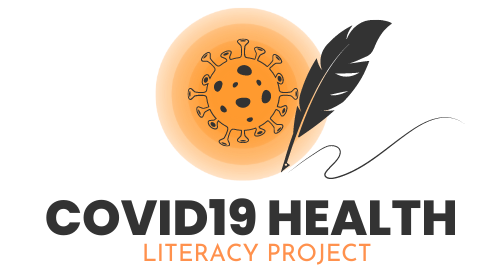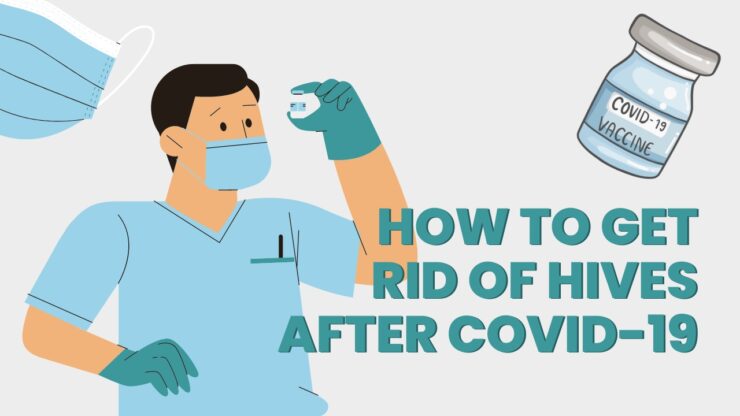Hives, also known as urticaria, are a common skin condition that affects millions of people worldwide. They are characterized by raised, red, itchy bumps on the skin that can range in size from small dots to large patches. Hives can occur for a variety of reasons, including allergic reactions, infections, and stress.
In recent months, there have been reports of people developing hives after contracting COVID-19. This has left many people wondering if there is a link between the two and what they can do to get rid of hives after a COVID-19 infection.
Understanding the Symptoms
They are often confused with other skin rashes, such as eczema and psoriasis. However, there are some key differences between hives and these other conditions.
The main symptom is the appearance of raised, red, itchy bumps on the skin. These bumps can appear anywhere on the body and can range in size from small dots to large patches. They may also be accompanied by swelling and a burning or stinging sensation.
Unlike other skin rashes, they typically come and go quickly. They can appear suddenly and disappear just as quickly, often within a few hours or days. This is because hives are caused by the release of histamine in the body, which triggers an inflammatory response in the skin.
The Link Between COVID-19 and Hives
While there is still much to learn about the relationship between COVID-19 and hives, there have been several studies that suggest a link between the two.
One study published in the Journal of the American Academy of Dermatology found that nearly 20% of COVID-19 patients experienced skin rashes, including hives. Another study published in JAMA Dermatology found that hives were the most common skin manifestation of COVID-19.
It is thought that hives may be a result of the body’s immune response to the virus. COVID-19 is known to cause an overactive immune response, which can lead to inflammation throughout the body, including the skin.
Common Treatments

The good news is that hives can usually be treated with over-the-counter medications, such as antihistamines and corticosteroids.
Antihistamines work by blocking the release of histamine in the body, which can help to reduce inflammation and relieve itching. Some common antihistamines include cetirizine, loratadine, and fexofenadine.
Corticosteroids, on the other hand, work by reducing inflammation throughout the body. They are typically prescribed in more severe cases of hives and can be taken orally or applied topically in the form of creams or ointments.
It is important to note that while these medications can be effective in treating hives, they may also come with side effects. It is always best to consult with a healthcare provider before starting any new medication.
Natural Remedies
In addition to medications, there are also several natural remedies that can help to relieve the symptoms of hives.
One of the most popular natural remedies for hives is oatmeal baths. Oatmeal is known for its soothing properties and can help to reduce itching and inflammation. Simply add a cup of finely ground oatmeal to a warm bath and soak for 15-20 minutes.
Aloe vera is another natural remedy that can help to soothe and heal the skin. It is known for its anti-inflammatory and antibacterial properties and can be applied topically in the form of an aloe vera gel or cream.
Other natural remedies for hives include:
- Cold compresses: Applying a cold compress to the affected area can help to reduce inflammation and relieve itching.
- Baking soda paste: Mix baking soda with water to create a paste and apply it to the affected area for 10-15 minutes.
- Chamomile tea: Brew a strong cup of chamomile tea and let it cool. Apply the tea to the affected area with a cotton ball.
While natural remedies can be effective in relieving the symptoms of hives, it is important to note that they may not be as effective as medications in more severe cases.
Lifestyle Changes That May Help
Making certain lifestyle changes may also help to prevent hives from occurring or recurring after a COVID-19 infection.
One of the most important things you can do is to reduce stress. Stress can trigger an overactive immune response, which can lead to inflammation throughout the body, including the skin. Try to find ways to manage your stress, such as through meditation, yoga, or deep breathing exercises.
Avoiding triggers is also important. Triggers can include certain foods, medications, or environmental factors such as heat or cold. Keep track of when your hives occur and try to identify any potential triggers.
When to Seek Medical Attention

While they are usually not a cause for concern, there are some situations where medical attention may be necessary.
If you experience any of the following symptoms along with your hives, seek medical attention immediately:
- Difficulty breathing
- Swelling of the face, lips, tongue, or throat
- Dizziness or fainting
- Rapid heartbeat
- Nausea or vomiting
These symptoms could be a sign of a severe allergic reaction, known as anaphylaxis, which requires immediate medical attention.
Long-Term Effects
For most of people, they will go away on their own within a few days or weeks. However, for some people, they can become a chronic condition that lasts for months or even years.
Chronic hives can be difficult to manage and may require more aggressive treatment, such as immunosuppressants or biological therapies.
If you have chronic ones, it is important to work with a healthcare provider to develop a long-term treatment plan that works for you.
Tips for Preventing
If you have had them after a COVID-19 infection, there are several things you can do to help prevent them from returning.
- Avoid triggers: As mentioned earlier, identifying and avoiding triggers is key to preventing them from returning.
- Take medications as prescribed: If you have been prescribed antihistamines or corticosteroids, make sure to take them as directed.
- Keep your skin moisturized: Dry skin can worsen the symptoms of hives, so be sure to keep your skin moisturized with a gentle, fragrance-free lotion or cream.
- Practice stress reduction techniques: As mentioned earlier, stress can trigger hives, so finding ways to manage your stress is important.
What to Do If Hives Persist After Treatment
If you have been treated for hives but they persist or continue to recur, it may be time to see a specialist, such as an allergist or dermatologist.
These specialists can perform tests to help identify any underlying conditions that may be causing your hives and develop a more targeted treatment plan.
How to Care for Your Skin After a Bout of Hives
It is important to take care of your skin to help it heal and prevent further irritation. Here are some tips for caring for your skin after a bout of hives:
Moisturize: Keeping your skin moisturized can help to soothe and heal it. Look for a gentle, fragrance-free lotion or cream and apply it to your skin after bathing or showering.
Use gentle cleansers: Avoid using harsh soaps or cleansers that can strip your skin of its natural oils. Instead, opt for gentle, fragrance-free cleansers that won’t irritate your skin.
Avoid hot water: Hot water can be drying and irritating to the skin. Stick to lukewarm water when bathing or showering.
Wear loose clothing: Tight clothing can irritate hives and make them worse. Opt for loose, comfortable clothing that won’t rub against your skin.
Possible Complications
While they are usually not a cause for concern, there are some potential complications that can arise, especially if they are left untreated.
One of the most common complications of hives is infection. Scratching at hives can break the skin and allow bacteria to enter, leading to an infection. To prevent infection, avoid scratching or rubbing them and keep your skin clean and moisturized.
Another potential complication is angioedema, which is a swelling of the deeper layers of the skin. This can occur in conjunction with hives and can be a sign of a more severe allergic reaction. If you experience swelling of the face, lips, tongue, or throat along with your hives, seek medical attention immediately.
The Role of Diet

While there is no specific diet that has been proven to prevent or treat hives, there are some foods that may be beneficial for their anti-inflammatory properties.
Some foods to consider incorporating into your diet include:
- Fatty fish, such as salmon and tuna, are high in omega-3 fatty acids
- Berries, which are high in antioxidants
- Leafy greens, such as kale and spinach, are high in vitamin C and other nutrients
It is also important to stay hydrated and limit your intake of processed foods, which can be high in sugar and other inflammatory ingredients.
FAQs
What should I do if hives persist after treatment?
If they persist after treatment, it may be time to see a specialist such as an allergist or dermatologist.
How can I care for my skin after a bout of hives?
To care for your skin after a bout of them, keep it moisturized, use gentle cleansers, avoid hot water, and wear loose clothing.
What are some possible complications of hives?
Complications can include infection and angioedema, a swelling of the deeper layers of the skin.
Can diet play a role in preventing and treating hives?
While there is no specific diet that has been proven to prevent or treat them, some foods may be beneficial for their anti-inflammatory properties.
Can hives occur after getting the COVID-19 vaccine?
While it is possible to develop them after getting the COVID-19 vaccine, it is a rare side effect.
Can stress cause hives?
Yes, stress can trigger them by causing an overactive immune response, which can lead to inflammation throughout the body, including the skin.
Conclusion
They can be frustrating and uncomfortable conditions, but with the right treatment and management, they can be effectively managed.
If you experience this infection, it is important to work with a healthcare provider to develop a treatment plan that works for you. This may include medications, natural remedies, and lifestyle changes.
Remember to take care of your skin by keeping it moisturized and avoiding harsh cleansers, and seek medical attention if you experience any severe symptoms.
With proper care and management, you can effectively manage hives after COVID-19 and prevent them from recurring in the future.

